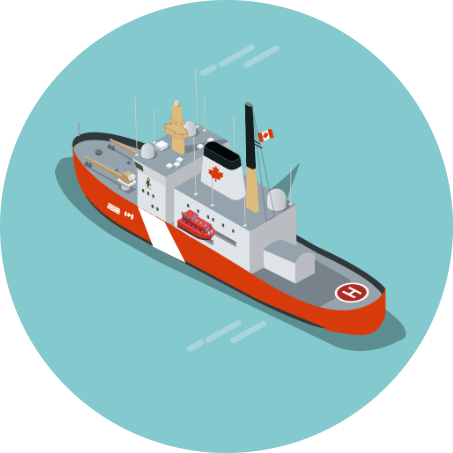
CANADIAN COAST GUARD VESSEL
In addition to its shore-based staff, the Canadian Coast Guard operates a diverse and multi-purpose fleet of vessels used for ice-breaking, buoy tendering, research, search and rescue operations, environmental response, and assisting other agencies with law enforcement.
Types of jobs:
Coast Guard marine officer, marine engineer, cook, marine technician, logistics officer, rescue specialist, ship’s electrician, deckhand, marine electronics technologist, mechanical assistant.
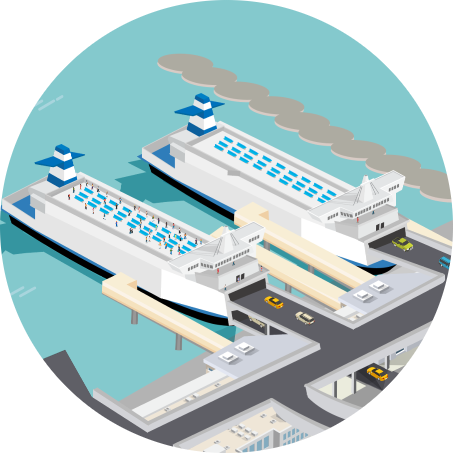
Ferry
Ferries transport people and vehicles across waterways, connecting communities and facilitating tourism and business across the country. There are also many other careers related to tours, Tall Ships, cruise vessels and recreational boating in Canada.
Types of jobs:
Ferry captain, ferry operator, ferry crew member, marine engineer, fleet maintenance, deckhand, officer, engine mechanic, customer service attendant, terminal services attendant, warehouse worker, equipment technician, communications specialist, administration assistant, and more!
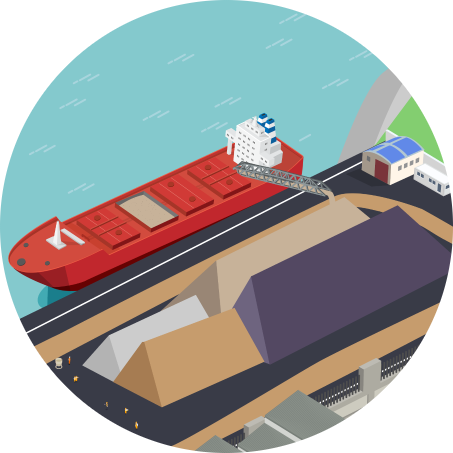
Cargo Ship
Canadian-flag cargo vessels transport goods and materials within domestic coastal and inland waterways and between Canada and the U.S. Vessels range in purpose and size from self-unloaders, bulkers, and general cargo to tankers and articulated tug & barges.
Types of jobs:
Captain, navigation officer, engineering officer, chief officer, chief engineer, deck crew, mechanical assistant or junior engineer, tunnelman or cargo handler, cook, steward and more!
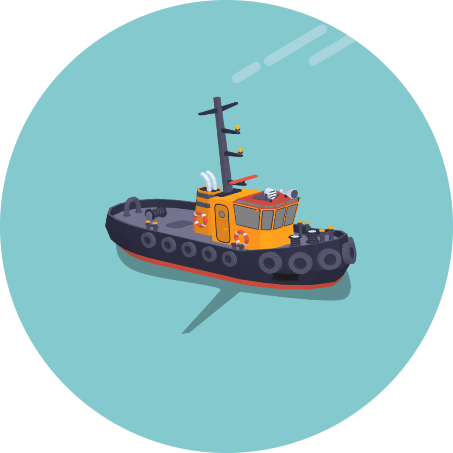
Tug
Tugboats are the unsung heroes of our waters. These mighty vessels play a crucial role in the marine industry, keeping ports running smoothly and supporting other vessels in various waterways. Tugboats work tirelessly in assisting ships, barge towing, breaking ice, performing salvaging operations, firefighting, offshore support, marine construction, dredging, environmental response, and even scientific research.
Types of jobs:
Tugboat captain, watchkeeping mate, tugboat operator, marine engineer, safety and compliance supervisor, deckhand, marine technician, mechanic, dispatcher, port captain, and crew supervisor.
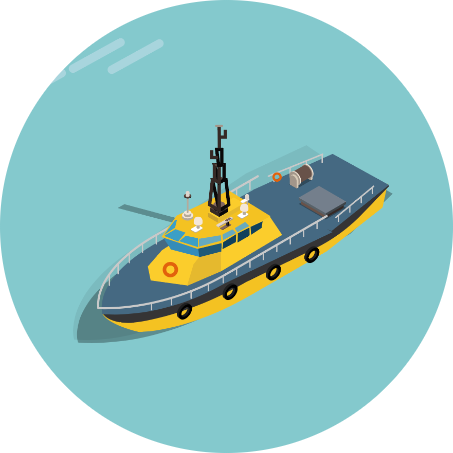
Pilot Boat
Pilot boats are used to transport marine pilots to and from ships entering a port, harbour or confined waterway that is a designated pilotage zone. Pilots are essential for ensuring the safe navigation of vessels and typically possess more than 20 years of education and at-sea experience before being licensed. Marine pilots are seasoned mariners who use their knowledge of local waters to safely guide vessels to their destination.
Types of jobs:
Marine pilot, pilot boat operator, navigation specialist.
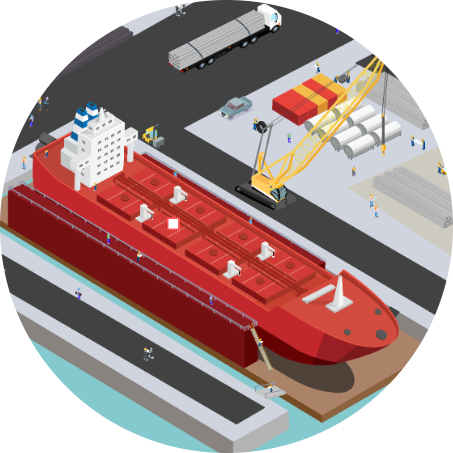
Shipyard
A shipyard is where ships are built, refitted, repaired, and maintained. Shipyards are crucial to the marine sector, providing jobs in their facilities but also creating economic spinoffs and jobs with countless marine industrial suppliers, trades and service providers. Canada's shipbuilding facilities work on vessels of all sizes and purposes, from large Navy vessels and cargo ships to 100-foot sailboats.
Types of jobs:
Engineer, naval architect, technician, technologist, mechanic (engine fitter), electrician, machinist, metal fabricator, welder, painter, pipefitting, general labourer, millwright, procurement, steelworker, sheet metal worker, crane operator, carpenter, supervisor, project manager, business development, administration, I.T. and technical services, and much more!

GOVERNMENT MARINE SERVICES
From Coast Guard to Transport Canada to the Transportation Safety Board, government's critical roles include marine policy, safety and security, regulatory, marine personnel certification, accident investigation and operational support in areas such as search and rescue, traffic management and icebreaking. In addition, the Royal Canadian Navy (RCN) protects Canadian sovereignty and interests at sea, at home and abroad.
Types of jobs:
Marine inspector, surveyor, investigator, marine safety specialist, marine policy analyst, marine transportation specialist, scientist, administration, marine communications and traffic services officer, informatics & technologists specialist and so much more!

Education & research facilities
Colleges and universities offer specific courses and programs to train the next generation of marine sector workers. In addition, there are government, academic, and private sector organizations conducting research and development into new ways and technologies to improve the industry and to protect marine environments and wildlife.
Types of jobs:
Marine researcher, marine biologist, marine educator, marine data analyst.

Port and terminal operations
Ports are where much of the marine sector comes together, from arriving and departing domestic and international ships to the movement of cargoes to the transiting of passengers. Port and terminal operators are major employers in Canada's marine sector.
Types of jobs:
Harbour master, commercial property leasing, infrastructure & construction, environmental programs, safety & security, stevedores, equipment & crane operators, maintenance, warehouse operations, superintendents, community liaison, management & administration and much more!

SHORE-SIDE SERVICES & SUPPORT
There are countless office-based positions in Canadian towns and cities that ensure the success of the marine sector from business development, corporate management, human resources and professional services to logistical, safety, infrastructure, technical and operational services.
Types of jobs:
Maritime lawyer, marine insurance provider, shipping agent, finance & accounting, commercial, marketing, business development, crewing officer/scheduler, human resources, economists, data analyst, consultant, IT, engineering, marine analyst.

Shore-Side Services and Support
There are countless office-based positions in Canadian towns and cities that ensure the success of the marine sector from business development, corporate management, human resources and professional services to logistical, safety, infrastructure, technical and operational services.
Types of jobs:
Maritime lawyer, marine insurance provider, shipping agent, finance & accounting, commercial, marketing, business development, crewing officer/scheduler, human resources, economists, data analyst, consultant, IT, engineering, marine analyst.
.png)
This infographic is meant to highlight different careers
in the marine sector and is not an accurate visual representation.
.png)
This infographic is meant to highlight different careers
in the marine sector and is not an accurate visual representation.
.png)
This infographic is meant to highlight different careers
in the marine sector and is not an accurate visual representation.
Click on the avatars below to learn more about different career pathways.
.png)

“I love how interesting my job is and that the work I do keeps my coworkers healthy and energized. I’m challenged to be creative while ensuring that we never have too much or too little.”
Richard
Chief Cook on a Canadian Coast Guard ship
Career Goals:
Gain as much diverse experience as possible in order to publish my own cookbook.
Career Motivator:
Fulfilling/Interesting Work
Job Description:
The Chief Cook is responsible for planning and preparing meals for the crew. They must ensure that meals are nutritious, tasty, and prepared safely in the ship's galley.
Training Required:
To become a Chief Cook, one must earn their Valid Marine Basic First Aid, and a Cook certificate issued by a recognized institute or a Transport Canada Ship’s Cook Certificate.
SALARY RANGE:
$55,000-$65,000
* Salary ranges are estimated based on industry standards and may vary depending on location, certifications, and experience.

“I love how interesting my job is and that the work I do keeps my coworkers healthy and energized. I’m challenged to be creative while ensuring that we never have too much or too little.”
.png)

“The typical 9 to 5 job wasn't what I wanted. I craved a fulfilling career where I could make money and travel while staying close to my favourite place - the water.”
Meredith
Second Mate on a bulk cargo ship
Career Goals:
Becoming the captain of a ship.
Career Motivator:
Adventure
Job Description:
The Second Mate is responsible for maintaining the safety and navigation of the vessel while it is underway. They work closely with the Captain and Chief Officer to ensure the ship is properly loaded and meets all safety regulations.
Training Required:
Officers hold licenses issued by Transport Canada. Becoming a navigation officer requires either gaining sufficient experience, accumulating sea time and passing the examinations, or by earning a (3-4 year) college diploma from a maritime college in Canada.
SALARY RANGE:
$90,000-$150,000
* Salary ranges are estimated based on industry standards and may vary depending on location, certifications, and experience.

“The typical 9 to 5 job wasn't what I wanted. I craved a fulfilling career where I could make money and travel while staying close to my favourite place - the water.”
.png)

“My job is a valuable one. Besides being secure, stable, and well-paying, I'm already making progress at my level of expertise; the world is my oyster.”
George
Stevedore at a port
Career Goals:
Becoming a certified crane operator.
Career Motivator:
Career Progression.
Job Description:
Stevedores are responsible for various tasks related to the handling and storage of cargo from ships at the port. This may involve operating cranes, forklifts, and other heavy machinery. They also help with general maintenance and cleaning of the port facilities.
Training Required:
Stevedores typically do not need formal education beyond a high school diploma or equivalent. However, on-the-job training and certification programs are often needed to safely operate heavy machinery.
SALARY RANGE:
$60,000-$150,000
* Salary ranges are estimated based on industry standards and may vary depending on location, certifications, and hours worked.

“My job is a valuable one. Besides being secure, stable, and well-paying, I'm already making progress at my level of expertise; the world is my oyster.”
.png)

“Every day, I take pride in being a member of an industry that is constantly raising the bar for environmental protection and changing the way people think about protecting the environment - because it takes care of all of us.”
Louise
Environmental Advisor at a Port Terminal
Career Goals:
Continue to implement new technologies and innovations to make the marine industry greener.
Career Motivator:
Environmental Sustainability
Job Description:
The Environmental Advisor is responsible for ensuring that the terminal meets all environmental regulations and standards. They work with various stakeholders, such as port authorities, shipping companies, and government agencies, to implement best practices and minimize the environmental impact of the terminal's operations.
Training Required:
To become an Environmental Advisor, one typically needs to obtain a degree in environmental science or a related field. Additional certifications and training may be required depending on the employer and jurisdiction, for example Environmental Professional (EP) designation.
SALARY RANGE:
$60,000-$90,000
* Salary ranges are estimated based on industry standards and may vary depending on location, certifications, and experience.

“Every day, I take pride in being a member of an industry that is constantly raising the bar for environmental protection and changing the way people think about protecting the environment - because it takes care of all of us.”
.png)

“Every day, I use cutting-edge technology to help create the next generation of ships! Together with my team, I feel that I’m contributing to long-term climate solutions in the marine industry.”
Derek
Naval Architect in an office and shipyard
Career Goals:
Become a Senior Architect and VP, overseeing a broad portfolio of design projects.
Career Motivator:
Advanced Technology
Job Description:
The Naval Architect is responsible for designing and overseeing the construction of ships and other maritime vessels. They work closely with engineers, designers, and project managers to ensure the vessel meets all safety and performance requirements.
Training Required:
To become a Naval Architect, one typically needs to obtain a degree or diploma in Naval Architecture or Marine Engineering. Additional certifications may also be required depending on the employer and the jurisdiction, for example Project Management Professional (PMP), or a Masters in Business Administration (MBA). Ongoing training and education are important for staying up-to-date with new technologies and regulations.
SALARY RANGE:
$80,000-$160,000
* Salary ranges are estimated based on industry standards and may vary depending on location, certifications, and experience.

“Every day, I use cutting-edge technology to help create the next generation of ships! Together with my team, I feel that I’m contributing to long-term climate solutions in the marine industry.”
.png)

“I enjoy balancing longer working periods onboard with extended time off to pursue additional training or interests like travel. Not only am I able to see my family and friends, but my free time onboard feels like home.”
Bailey
Mechanical Assistant on a ship
Career Goals:
Earn an engineering certificate from a marine college to become a Chief Engineer.
Career Motivator:
Work-Life Flexibility
Job Description:
The Mechanical Assistant is responsible for assisting the Chief Engineer in the maintenance and repair of the ship's mechanical systems, such as engines, generators, and pumps. They also help with routine inspections and other tasks as needed.
Training Required:
To become a Mechanical Assistant, one must earn their ship safety training, Marine Emergency training, Basic Medical training and a combination of onboard experiences.
SALARY RANGE:
$65,000-$130,000
* Salary ranges are estimated based on industry standards and may vary depending on location, certifications, and experience.
 “I enjoy balancing longer working periods onboard with extended time off to pursue additional training or interests like travel. Not only am I able to see my family and friends, but my free time onboard feels like home.”
“I enjoy balancing longer working periods onboard with extended time off to pursue additional training or interests like travel. Not only am I able to see my family and friends, but my free time onboard feels like home.”
.png)
.png)
.png)
.png)
.png)
.png)
.png)
.png)
.png)
.png)
.png)
.png)
EXPLORE OUR EDUCATIONAL & CAREER RESOURCES
SHIPPING ON THE SEAWAY
Take a 360-degree tour of a Trillium Class cargo ship with Francis Lavoie, the first officer of the CSL St-Laurent. Explore the ship’s cargo holds, navigation bridge, crew areas, and engine room, and get a glimpse of life at sea!
CAREER
QUIZ
We've put together 5 short questions to help guide you on your career path, with recommendations and helpful links.
TRIvIA
How much do you know about marine?
Put your skills to the test with our Why Marine quiz.
OUR VIDEOS
What's working in a marine career really like? Explore our "Day in the Life" video series to find out!
MARINE MONTH IN CANADA
Marine Month in Canada is a free educational program focusing on marine careers, designed for youth in Grades 5-12 who want a behind-the-scenes look at unique opportunities within the marine industry.
WHY marine
Marine careers in Canada are as diverse as you are. From high-tech and hands-on roles to work that supports the environment, offers adventure, balance, purpose, and room to grow, there’s a place for you.
JOB
BOARD
Visit our job board to explore current openings and opportunities across Canada’s marine sector.

